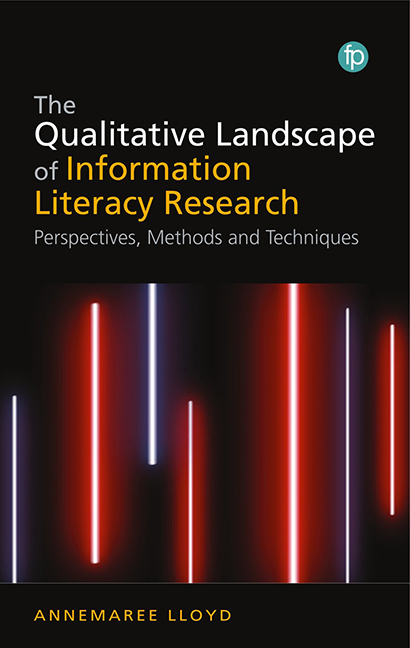Book contents
- Frontmatter
- Contents
- Figures
- Foreword
- Acknowledgements
- Introduction: The Qualitative Landscape of Information Literacy Research
- Chapter 1 Situating Information Literacy Research
- Chapter 2 Informing Information Literacy Research
- Chapter 3 Framing Information Literacy as an Educational Practice for Research. Learning Theories and Models
- Chapter 4 Qualitative Methods in Information Literacy Research
- Chapter 5 Collecting Data About Information Literacy: Data Collection Techniques
- Chapter 6 Planning for Research
- Chapter 7 Qualitatively Speaking and Doing Information Literacy Research
- References
- Index
Chapter 1 - Situating Information Literacy Research
Published online by Cambridge University Press: 21 October 2021
- Frontmatter
- Contents
- Figures
- Foreword
- Acknowledgements
- Introduction: The Qualitative Landscape of Information Literacy Research
- Chapter 1 Situating Information Literacy Research
- Chapter 2 Informing Information Literacy Research
- Chapter 3 Framing Information Literacy as an Educational Practice for Research. Learning Theories and Models
- Chapter 4 Qualitative Methods in Information Literacy Research
- Chapter 5 Collecting Data About Information Literacy: Data Collection Techniques
- Chapter 6 Planning for Research
- Chapter 7 Qualitatively Speaking and Doing Information Literacy Research
- References
- Index
Summary
Introduction
In 1974 Paul Zurkowski (1974), reflecting on the capabilities of people to cope with the emerging complexity of the information age, coined the term information literacy. The practice of information literacy was connected to the achievement of economic and organisational goals and to people's ability to solve problems and workplace tasks (Lloyd, 2010a). Zurkowski's observation about the role of information and people's capacity to deal with information in complex situations acted as the catalyst for information literacy research within the library and information science field. The concept of information literacy has been adopted by public, school and academic librarians and is now established in the profession as a core aspect of professional practice.
Research into and about information literacy has also become a significant field for library and information science academics, who investigate the phenomenon from many different perspectives. While some researchers are interested in information literacy as a skill or an inquiry strategy which supports learning, other researchers attempt to understand the complex dimensions of the practice, i.e. what conditions enable and/or constrain it, and how the practice contributes to formal and informal learning leading to the development of information landscapes and to building information resilience.
It is central to our professional information literacy practice (as researchers or practitioners) that we develop a critical understanding of how information literacy is shaped and that we understand how research is operationalised and executed, either to undertake our own research or to evaluate the corpus of research about information literacy that we use to support our own work. The aim of this book is therefore to provide a primer or guide to the range of qualitative research, theories, methods and techniques being employed to investigate and describe the complexity of the practice.
A theory of information literacy landscapes
This book is framed and positioned by the theory of information literacy landscapes described by Lloyd in 2010a; 2010b; 2017a. Information literacy is view by her as:
A practice that is enacted in a social setting. It is composed of a suite of activities and skills that reference structured and embodied knowledge and ways of knowing relevant to the context. Information literacy is a way of knowing.
(Lloyd, 2010a, extended in Lloyd, 2017a)- Type
- Chapter
- Information
- The Qualitative Landscape of Information Literacy ResearchPerspectives, Methods and Techniques, pp. 1 - 18Publisher: FacetPrint publication year: 2021



